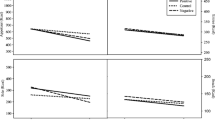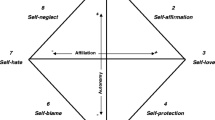Abstract
A long theoretical tradition has linked guilt with internalizing disorders. We find no evidence, however, that a greater personality proclivity for guilt is related to depression or eating disturbances as reported by 85 female undergraduates. Females also described guilt-producing incidents involving school versus eating and exercise. We examined reactions to the events including guilt feelings and perceived effectiveness in alleviating these feelings, intropunitive responses, action tendencies, and rationalizations. Both depression and eating disturbances were unrelated to guilt feelings over school, but were related to guilt feelings over eating and exercise. Ineffective alleviation of guilt feelings in both domains was correlated with depression and greater eating disturbances. Women who reacted to guilt-producing events with fewer intropunitive responses such as rumination and self-hatred, and by confiding in others, distancing, and rationalizing their actions through justifications and excuses were less likely to have eating disturbances.
Similar content being viewed by others
References
American Psychiatric Association. (1987).Diagnostic and statistical manual of mental disorders, 3rd ed., rev. Washington, DC: American Psychiatric Association.
Baumeister, R. F., Stillwell, A. M., & Heatherton, T. F. (1994). Guilt: An interpersonal approach.Psychological Bulletin, 115, 243–267.
Beck, A. T. (1967).Depression: Clinical, experimental, and theoretical aspects. New York: Harper & Row.
Billings, A. G., & Moos, R. H. (1981). The role of coping responses and social resources in attenuating the stress of life events.Journal of Behavioral Medicine, 4, 139–157.
Blatt, S. J. (1979).Depressive Experiences Questionnaire. Yale University: New Haven, CT.
Blatt, S. J., & Schichman, S. (1983). Two primary configurations of psychopathology.Psychoanalysis and Contemporary Thought, 6, 187–255.
Bybee, J., Merisca, R., & Velasco, R. (in press). The development of reactions to guilt-producing events. In J. Bybee (Ed.).Guilt and children. New York: Academic.
Bybee, J., & Zigler, E. (1991). The self-image and guilt: A further test of the cognitive-developmental formulation.Journal of Personality, 59, 733–745.
Cole, P. M., Michel, M. K., & Teti, L. O. (1994). The development of emotion regulation and dysregulation: A clinical perspective. In N. A. Fox (Ed.). The development of emotion regulation: Biological and behavioral considerations.Monographs of the Society for Research in Child Development, 59 (2–3, Serial No. 240).
Dunn, R. K., & Ondercin, P. (1981). Personality variables related to compulsive eating in college women.Journal of Clinical Psychology, 37, 43–49.
Fairburn, C. G., & Cooper, P. J. (1984). The clinical features of bulimia nervosa.British Journal of Psychiatry, 144, 238–246.
Frank, E. S. (1991). Shame and guilt in eating disorders.American Journal of Orthopsychiatry, 61, 303–306.
Garner, D. M., Olmsted, M. P., Bohr, Y., & Garfinkel, P. E. (1982). The Eating Attitudes Test: Psychometric features and clinical correlates.Psychological Medicine, 12, 871–878.
Garner, D. M., Olmsted, M. P., & Polivy, J. (1983). Development and validation of a multidimensional eating disorder inventory for anorexia nervosa and builimia.International Journal of Eating Disorders, 2, 15–34.
Gross, J., Rosen, J. C., Leitenberg, H., & Willmuth, M. E. (1986). Validity of the Eating Attitudes Test and the Eating Disorders Inventory in bulimia nervosa.Journal of Consulting and Clinical Psychology, 54, 875–876.
Harder, D. W. (1995). Shame and guilt assessment and relationships of shame- and guilt-proneness to psychopathology. In J. P. Tangney & K. W. Fischer (Eds.).Self-conscious emotions: The psychology of shame, guilt, embarrassment, and pride. New York: Guilford.
Harder, D. W., Cutler, L., & Rockart, L. (1992). Assessment of shame and guilt and their relationships to psychopathology.Journal of Personality Assessment, 59, 584–604.
Johnson, C., & Larson, R. (1982). Bulimia: An analysis of moods and behavior.Psychological Medicine, 44, 341–351.
Kovacs, M. (1992).Children’s Depression Inventory. North Tonawanda, NY: Multi-Health Systems.
Kugler, K., & Jones, W. H. (1992). On conceptualizing and assessing guilt.Journal of Personality and Social Psychology, 62, 318–327.
Mosher, D. L. (1966). The development and multi-trait-multi-method matrix analysis of three measures and three aspects of guilt.Journal of Consulting Psychology, 30, 25–29.
Mosher, D. L. (1979). The meaning and measurement of guilt. In C. E. Izard (Ed.),Emotions and personality in psychopathology (pp. 105–129). New York: Plenum.
Prather, R. C., & Williamson, D. A. (1988). Psychopathology associated with bulimia, binge eating, and obesity.International Journal of Eating Disorders, 7, 177–184.
Quiles, Z., & Bybee, J. (in press). Guilt and mental health. In J. Bybee (Ed.).Guilt and children. New York: Academic.
Scott, M. B., & Lyman, S. M. (1968). Accounts.American Sociological Review, 33, 46–62.
Striegel-Moore, R., Silberstein L., & Rodin, J. (1986). Toward an understanding of risk factors for bulimia.American Psychologist, 41, 246–263.
Tangney, J. P., Burggraf, S. A., & Wagner, P. (1995). Shame-proneness, guilt-proneness, and psychological symptoms. In J. P. Tangney & K. W. Fischer (Eds.),Self-conscious emotions: The psychology of shame, guilt, embarrassment, and pride. New York: Guilford.
Tangney, J. P., Wagner, P., Fletcher, C., & Gramzow, R. (1992a). Shamed into anger? The relation of shame and guilt to anger and self-reported aggression.Journal of Personality and Social Psychology, 62, 669–675.
Tangney, J. P., Wagner, P., & Gramzow, R. (1992b). Proneness to shame, proneness to guilt, and psychopathology.Journal of Abnormal Psychology, 101, 469–478.
Thompson, D. A., Berg, K. M., & Shatford, L. A. (1987). The heterogeneity of bulimic symptomatology: Cognitive and behavioral dimensions.International Journal of Eating Disorders, 6, 215–254.
Thompson, R. A. (1994). Emotion regulation: A theme in search of definition. In N. A. Fox (Ed.), The development of emotion regulation: Biological and behavioral considerations.Monographs of the Society for Research in Child Development, 59 (2–3, Serial No. 240).
Vandereycken, W., & Meerman, R. (1984).Anorexia nervosa: A clinician’s guide to treatment. New York: De Gruyter.
Wallington, S. A. (1973). Consequences of transgression: Self-punishment and depression.Journal of Personality and Social Psychology, 28, 1–7.
Williams, C., & Bybee, J. (1994). What do children feel guilty about? Developmental and gender differences.Developmental Psychology, 30, 617–623.
Zahn-Waxler, C., Cole, P. M., & Barrett, K. C. (1991). Guilt and empathy: Sex differences and implications for the development of depression. In J. Garber & K. Dodge (Eds.),The development of emotion regulation and dysregulation (pp. 243–272). Cambridge: Cambridge University Press.
Author information
Authors and Affiliations
Rights and permissions
About this article
Cite this article
Bybee, J., Zigler, E., Berliner, D. et al. Guilt, guilt-evoking events, depression, and eating disorders. Current Psychology 15, 113–127 (1996). https://doi.org/10.1007/BF02686944
Accepted:
Issue Date:
DOI: https://doi.org/10.1007/BF02686944




